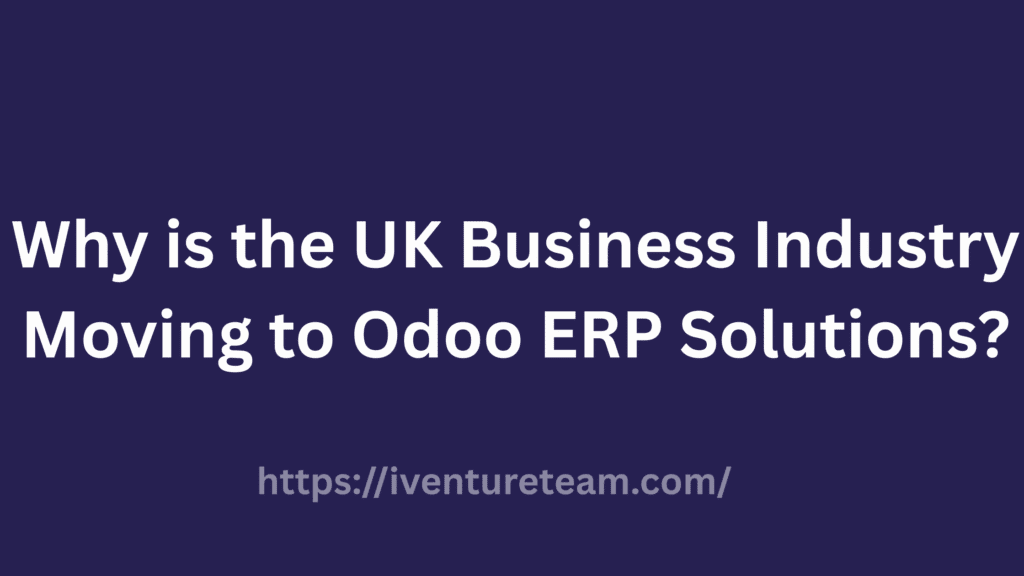UK companies are rapidly changing their business strategies. Due to the combination of new customer expectations, economic pressure, and competition, they are looking for new ways to manage daily operations. There have been many cases where businesses were tied to outdated technologies that were not only slow but also expensive and difficult to update. These tools eventually led to delays, errors, and the team taking on more work as the company grew.
The UK businesses transitioning to Odoo ERP, a contemporary end-to-end solution, a modern system that uses everything such as sales, accounts, HR, stock, and marketing access are nothing more than software dependencies. Odoo has gained the stature of the best option due to its reasoned pricing strategy, multifunctional capability, and ease of upgrading, as companies look for complete digital solutions.
Table of Content
- 1 What Is Odoo ERP?
- 2 Challenges Faced by UK Industries Before Odoo
- 3 Benefits of Odoo ERP for UK Industries
- 3.1 1. Cost-Effective ERP Solution Without Compromising Quality
- 3.2 2. Full Business Process Automation
- 3.3 3. Real-Time Visibility for Faster Decision-Making
- 3.4 4. Scalability for SMEs and Large Enterprises
- 3.5 5. Compliance with UK Regulations
- 3.6 6. Seamless Integration with Existing Systems
- 3.7 7. Industry Versatility
- 3.8 8. Enhanced Collaboration and Team Productivity
- 3.9 9. Customization to Fit Unique UK Business Needs
- 3.10 10. Long-Term ROI and Competitive Advantage
What Is Odoo ERP?
Odoo ERP is an open-source software platform that caters to the needs of companies by providing them with a single point of control for all business processes. In place of multiple applications, it creates one connected system. Odoo allows you to share everything together, so teams can work faster and more easily.
One of the main factors contributing to Odoo’s increase in popularity in the UK is its modular architecture. One full system does not have to be purchased by the companies at once. They can start with one or two modules and then add more as they expand. This gives them complete control over costs and processes without imposing large upfront investments.
The straightforward user interface is yet another benefit. Odoo can be easily picked up even by those with no technical expertise, which ensures that shifting from the old systems is done in a seamless and manageable manner.
Key Features of Odoo ERP
The Odoo system has a lot of excellent features that allow UK enterprises to increase their productivity, keep their work organized, and manage all activities through a single, user-friendly system.
1. Modular and Scalable Structure
Odoo has a library of modules for every business task. You can activate CRM, billing, payroll, or stock only when needed. This avoids paying for extra tools that add no value. As companies grow, they can add more modules without switching systems. This keeps everything simple and well-connected.
2. Centralized Business Management
Many UK companies used to depend on different tools for different tasks. This caused data mismatches and confusion. Odoo addresses the situation by merging all data relating to the business into a single location. The entire organization has access to the same information that is constantly updated, thus minimizing mistakes and promoting a more fluid process.
3. Real-Time Dashboards & Analytics
Odoo gives managers access to dashboards along with the data in real-time. They can monitor sales, inventory, financial status, projects, and HR performance all at the same time. These factors help them to be quicker in taking market changes into account and in making sure of their decision-making.
4. Industry Agnostic
One of the most significant advantages of Odoo is that it is not limited to any particular industry or sector. Retail, manufacturing, service, logistics, healthcare, education, finance, and e-commerce are areas where Odoo is in use and giving good results. The system is easily adjusted to fit different requirements, so it is an established standard in both specialized and wide markets.
5. Deployment Flexibility
Companies in the UK have the option of choosing how they want Odoo implementation. There is the possibility to install it on-site, deploy it in the cloud, or go for a hybrid approach. This option allows organizations to tailor data security, costs, and procedures to their preferred deployment.
6. Seamless Integrations
Odoo has the capability of seamlessly connecting with various third-party applications. Many companies prefer the Odoo integration because the Odoo connection is less problematic compared to regular ERP systems.
7. Open-Source Customization
Odoo Customization is extensively possible as it is an open-source solution. Developers have the power to create new fields, alter workflows, develop new apps, or change screens. All of these things are what make the system highly adaptable.
Challenges Faced by UK Industries Before Odoo
Many businesses in the UK, before the transition to Odoo, had to deal with outdated systems that were really slow, very expensive, and did not meet the requirements of modern times.
1. Data Silos and Lack of Integration
Before Odoo, many companies used different tools for every task. Sales had one system, stock had another, and accounts had a third. Since these systems did not talk to each other, employees spent hours transferring data manually. This created delays, confusion, and errors.
2. High ERP Licensing Costs
The pricing of the classic ERP solutions was just a thing. Licensing, renewal, training fees, and long-term contracts have made it very hard for small and medium enterprises to adopt them. A lot of businesses desired a contemporary solution, but were not able to bear the cost of the overpriced ones.
3. Complex & Inflexible Systems
Older software systems were hard to change. Even adding a small feature required long processes and large fees. This slowed down company growth and forced teams to use tools that no longer matched their needs.
4. Delayed Decision-Making
Without real-time reports, the managers always made their decisions on the basis of past information. Delays in decisions made operations sluggish as they waited for reports, manual updates, and team inputs.
5. Poor Scalability
Old systems, over which companies could not expand, were not capable of even handling the added data or new features, bringing out the scaling issue and IT costs along with it.
6. Limited Automation
Manual labor was the only method used for many tasks, such as billing, payroll, stock updates, and customer follow-ups, which drained time and also made the probability of errors very high.
Benefits of Odoo ERP for UK Industries
Odoo helps UK businesses get rid of their old, unsolved problems, and at the same time, offers a new, modern platform that is capable of enhancing productivity, lowering costs, and supporting the business in the long run.
1. Cost-Effective ERP Solution Without Compromising Quality
Odoo is the most cost-effective ERP solution in most cases, as one has to pay only for installed modules, thanks to its flexible pricing and no heavy licensing fees. This allows both small and large businesses to save on software costs.
2. Full Business Process Automation
Odoo’s automation includes invoice reminders, stock updates, email campaigns, payroll, and sales workflow. Consequently, staff work more actively, and productivity rises across the board.
3. Real-Time Visibility for Faster Decision-Making
Odoo’s instant information update enables the manager to have an accurate data view all the time. This, in turn, accelerates decision-making and minimizes the risks arising from using outdated data.
4. Scalability for SMEs and Large Enterprises
Odoo grows with the business. Startups can use basic modules while large companies can use advanced ones. This scalability makes it suitable for companies of all sizes in the UK.
5. Compliance with UK Regulations
Odoo supports UK-specific needs such as VAT rules, financial reporting standards, payroll norms, and audit requirements. This helps companies avoid legal issues and maintain smooth operations.
6. Seamless Integration with Existing Systems
Odoo connects with tools UK firms already use. This means companies do not need to replace everything at once. Instead, they can make a smooth shift at their own pace.
7. Industry Versatility
Odoo fits many sectors. Retailers like the POS features. Manufacturers use production and quality modules. Service companies use CRM and project tools. This is why many companies look for the best Odoo partners in the UK to build a perfect system.
8. Enhanced Collaboration and Team Productivity
Odoo improves teamwork by giving everyone shared access to data. Staff do not have to switch between systems or wait for updates from other departments.
9. Customization to Fit Unique UK Business Needs
Every UK company works differently, as they have their own rules, workflow, and processes. With Odoo, businesses can shape the software to match these needs through advanced Odoo development supported by experts.
10. Long-Term ROI and Competitive Advantage
Odoo has a long-term value that is continuously realized. The enhancement in overall performance through cost savings, speed increase, and accuracy improvements, along with better planning, is granted to the companies. These companies have gained a sharp competitive advantage and are able to grow gradually.
Conclusion
The UK business industry is moving to Odoo, as it is a way to make things easier, lessen the financial burden, and help the company grow. It gets rid of the hassles associated with the use of old systems and provides a flexible, modern, and powerful platform that is suitable for any type of business. Odoo has already been hailed as the future of business management because of its automation, real-time insights, easy scaling, and strong integration capabilities.
Companies planning a digital upgrade often choose Odoo implementation or prefer to hire Odoo developers to build a system that fits their exact needs. With the right setup, Odoo becomes more than an ERP. It becomes the foundation for long-term success and smart growth.
Related Post:








